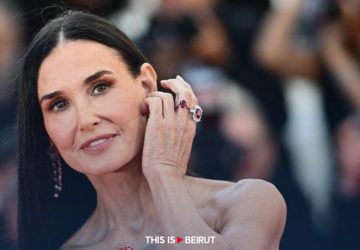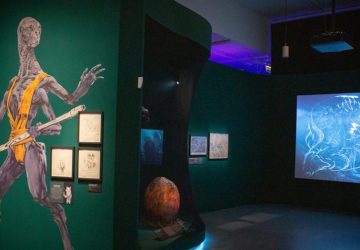Listen to the article
Nadine Labaki, an internationally renowned Lebanese director, screenwriter, and actress, embarks on a new adventure by serving on the official feature film jury at the world-famous Cannes Film Festival this year. Having already walked the Croisette as a director, a member of the Un certain regard jury, and having received the Jury Prize for her film Capharnaüm, she granted This is Beirut an exclusive interview where she discusses this new role. In this exchange, Labaki opened up about the unique experience of being part of the jury tasked with awarding the prestigious Palme d’Or, as well as her cinematic journey and vision of the 7th art.
Nadine Labaki’s films are characterized by their profound humanity, which shines through both the main narrative and the intimate stories of the characters. The Lebanese director excels in the art of highlighting these individual destinies, depicting them with sensitivity and authenticity. Her works, imbued with vivid colors and accompanied by memorable soundtracks, manage to touch the viewer’s heart. Labaki knows how to capture the very essence of the human condition — its joys, sorrows, and hopes — to offer a genuine and universal cinematic experience.
As an actress, she is moving in front of the camera. In her daily encounters, she remains grounded, open-minded, and curious about people and films. She takes the time to stop and chat with those she meets, or to “lose herself for two hours” in a movie theater, outside of time and space, in a suspended moment “stolen from life.”
For you, “cinema is an experience and an encounter.” What kind of encounter do you have when you are on the other side of the production as a jury member?
For me, it’s an invitation into an unknown world. Meeting the jury members or watching a film is above all about discovering other perspectives, emotions, levels of maturity, and various facets of human nature. It’s also about encountering other cultures. This is what I generally seek — the point of view of another director, their obsessions or needs, their perceptions.
Apart from the pride of “carrying Lebanon’s name internationally,” what emotion takes hold of you when you act in a film with Fanny Ardant in Back to Alexandria?
Initially, it was an encounter with a woman who fascinates me. What interested me most in this project was not only working with Fanny Ardant, but also getting to know her beyond the myth, discovering her as a person, sharing time and captivating moments with her, and exchanging our experiences as women and about life. For me, acting is about freezing a moment eternally on screen, and it was an opportunity to capture those moments with Fanny Ardant.
The Cannes Film Festival holds a special place in your cinematic journey. You have participated as a director, then as a member of the Un certain regard jury, and now you are a member of the official feature film jury. How has your perception of this event evolved through these different experiences, and what does the Cannes Film Festival represent for you today?
I remember all those challenging moments spent in Cannes as a film student, where everything seemed inaccessible. Cannes was then a completely out-of-reach world. I went there with Zeina Sfeir, my sister Caroline Labaki, and Jihad Hojeili, my co-screenwriter. We were in total admiration of this inaccessible universe, where entering a movie theater was an unattainable privilege.
Over time, I made my first, second, and then third film, and each time, a new door opened. I had a new encounter, new possibilities where I made my entry into this world and became a member of this global cinema family. Little by little, I went through the steps… It’s impressive.
As a member of the jury at the prestigious Cannes Film Festival, you will be required to view and judge cinematographic works from around the world. How do you approach this responsibility? What emotions do you feel about being part of this selection process?
Being part of the jury is a great privilege. It’s the realization of a little girl’s dream who is passionate about cinema. It’s also a recognition of my work. Cannes is one of the greatest festivals in the world, not only from a prestige standpoint, but also because it is very selective — the films presented there are generally of high quality.
Knowing that a film has been selected at Cannes, whether it is part of the official selection or the Un certain regard category, arouses my curiosity. This quality stamp often promises an enriching experience. Having such exposure for a film is extraordinary, thanks to the press, producers, and cinema professionals from all over the world who are present there.
What do you think of the official selection for this edition?
This year’s official selection includes big names. I can’t wait to discover the films of great masters of cinema such as Yorgos Lanthimos, Paolo Sorrentino, and Francis Ford Coppola. I don’t really like the term “judge.” It is an honor for me to be able to debate and exchange different points of view with the other jury members.
Too often, one can be fascinated by a film and leave the theater only to discover that jury members have completely different opinions. It’s always very interesting to realize that there are so many different perceptions.
Your journey in the world of cinema has been marked by many stages: passionate student, then acclaimed director, screenwriter, and actress around the world. Throughout this evolution, has your perception of the very particular space that is the movie theater been modified? Are there aspects of this cinematographic “bubble” that have remained unchanging in your eyes, constants that persist despite the changes brought about by your growing experience?
The sacredness of the movie theater is always the same; it’s a spiritual experience to enter this bubble, this dark room, and to be there just to see a film without any other distraction. It’s captivating to be caught up for two hours in a collective experience because you feel the energy of the other spectators. It’s truly a collective ritual.
Nothing has changed for me. I maintain the same enthusiasm for this experience. Sometimes, emotions overwhelm me even before the film begins. I attach great importance to this time spent in a movie theater, because it’s two hours that we steal from our daily lives, while we are constantly in a hurry and under stress.
I always want to be caught up in this overflow of emotions, discoveries, strong sensations, an unknown culture, and to be able to identify with characters in a particular experience that, despite the passage of time, has lost none of its brilliance.
Has making cinema your profession dulled the passion that drove you at the beginning? Is there a part of this love for the 7th art in you that remains intact and unalterable?
On the contrary, passion does not fade with time; there is more self-knowledge and a technical know-how that is less daunting. We are less stressed, and we devote ourselves more fully to the content. We take more pleasure in telling the stories we want to share.
Also, my desire for discovery and my fascination with the unknown remain the same. Curiosity has not changed in me. I am still very curious and naive, even when faced with the unfamiliar.
Instagram: @mariechristine.tayah









